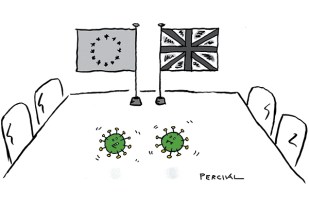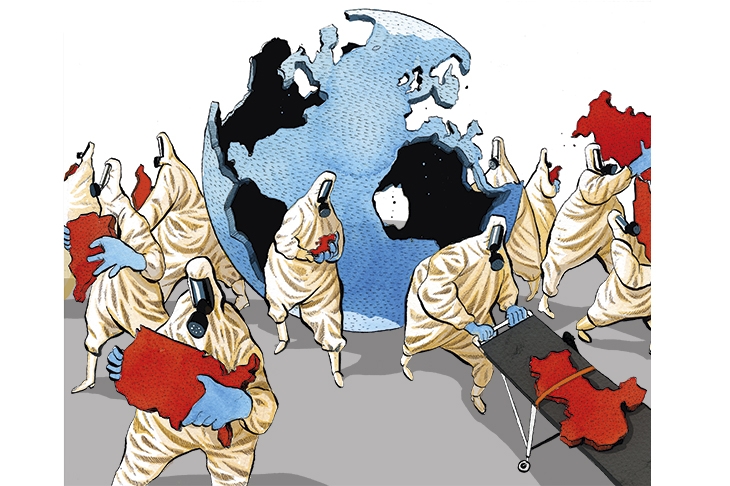Ten years ago, the World Health Organisation issued a new definition of ‘pandemic’: a disease that infects a large number of people and spreads quickly across the world. These days, once the first of these criteria has been fulfilled, the second is generally just behind. Everything travels faster now: goods, services, diseases and — crucially — fear. As the number of Covid-19 cases rises, so too does the cost of our reaction to it: already as much as $1.5 trillion from cancelled flights, postponed orders and businesses shutting down — an inevitable outcome in our globalised, interconnected world.
A virus that germinated in Wuhan has led to the cancellation of this weekend’s rugby match between Italy and Ireland in Dublin. The Tokyo Olympics, London Marathon and Glastonbury festival could be next. Boris Johnson’s ‘battle plan’ to delay and mitigate the spread of coronavirus includes the possibility of no-go zones and bans on mass gatherings. Across the world, business trips and conferences are being cancelled, orders put on hold. But this isn’t just a critical moment for particular businesses, or even a particular country — it might prove to be a tipping point for globalisation itself.
For most of the past two decades, globalisation has been the norm — neither questioned nor contested by any of the world’s largest countries. It has been seen, in short, as the future. Increasing connectivity and expanding markets have made everyone richer. If you could drive costs down by making iPhones in China or by peeling Scottish langoustines in Thailand, why hesitate?
And it worked, for millions. Poverty plummeted, life expectancy soared. By buying cheaply, we shared our wealth. Who could object?

But globalisation also causes disruption. Automation, wage stagnation and the decline of traditional industries spoiled the party somewhat, as plenty of participants grew increasingly disgruntled about how they fared in the system. Rightly or wrongly, many now blame globalisation for their woes. Coronavirus has just spoiled the party a lot more, reminding us of the risks we face when, for example, half of British tool manufacturing is sourced from China. When factories close overseas, work slows down at home: regardless of the trajectory of the disease now, the OECD expects it to have flattened whatever economic growth there would have been this year. Those aren’t just numbers on a spreadsheet; they’re billions of pounds of wealth and resources, wiped right off the map.
To Donald Trump, this all proves his point. Two years ago he told the UN General Assembly council that he rejected ‘globalism’, and has since doubled down on trade wars with China to prove it. He was mocked then, but today even Emmanuel Macron, the would-be leader of global liberalism, has come to acknowledge that globalisation is facing a ‘major crisis’. The European Union’s idea of a borderless future has come under threat from its own voters and the exigencies of demographic change. Borders and barriers are back, designed first to halt the flow of migrants and now to check disease. When Austria decided it wanted a border wall with Italy last month, it fitted a trend: when the Berlin Wall fell in 1989, there were 15 walls or fences dividing countries around the world. Now, there are 77 — and counting.
Just-in-time manufacturing is cheap and efficient, but highly unstable when a global shutdown strikes
Coronavirus itself is a potent agent of deglobalisation. It has shut down travel for locals and tourists alike, prevented employees from showing up to work, put shops and restaurants on lockdown, and cut off the supply chains between countries. When the Sars virus broke out in 2002, China accounted for just 4 per cent of the world economy. Today it’s 16 per cent. The global economy grew in China’s favour because a great many companies came to rely on cheap Chinese exports, not overly concerned about the risk that comes with making an authoritarian regime the hub of global production. But priorities and attitudes are quickly changing.
The idea of globalisation was built on the free (or almost free) movement of goods and people from one place to another. Covid-19 has provided another reminder that this model is under threat at every turn: from populists, terrorists, and now from a new virus. Our ‘just-in-time’ manufacturing processes — where machine parts are delivered just before being assembled into a product — have proven to be cheap and efficient, but they are highly unstable when a global shutdown strikes. From tech companies to drug manufacturers, vulnerabilities in supply chains have been exposed. European carmakers are already feeling the strain on their production lines. Cutting off Germany’s car industry from foreign suppliers (or Chinese buyers) could be enough to tip the country into recession.
Plenty of companies already know they are too dependent on production processes that are out of their control. Tariffs, trade wars and China’s loose attitude to intellectual property rights were serious concerns long before Beijing’s ability to handle an epidemic was called into question. Last autumn, Apple assessed how costly it would be to move a third of its production out of China, in order to diversify in south-east Asia. But while there is a trend for companies to reduce, stall or cancel investment in China, it’s a slow and difficult process.
For years, world trade optimists have been waiting for things to get back to ‘normal’ after the crash of 2008. They never did — and perhaps never will. The crash didn’t just knock confidence in the stock market and housing markets. It challenged our belief that globalisation in its current form could remedy a new set of economic woes. Global trade has slowed substantially since 2012, making this the longest period of relative trade stagnation since the second world war. Global foreign direct investment has now been on the decline for three years running.
The huge advancements achieved by connecting the world have been taken for granted, and now a spotlight is being directed at globalisation’s weaknesses. The rise of international business has left employees feeling disconnected from faceless bosses, fuelling resentment about inequality and hostility towards those in change. Concerns about the environment are coming into conflict with the amount of carbon emissions required to get ourselves and our stuff transported around the world.
We don’t know yet how the coronavirus death toll will compare to that of normal seasonal flu (an average of 17,000 in the UK annually), but it seems likely that the virus will have a long-lasting impact, marking a turning point in the history of hyper–globalisation. The status quo has run out of political capital.
Increasingly political leaders and business chiefs view interconnectivity with the rest of the world as a liability, rather than as an asset. There’s an appetite for technology that will help scale back dependency on foreign production: advances in areas such as 3D printing may overhaul or render obsolete the supply chain routes that have been necessary since global trade began. Cheaper renewable energy might rekindle the case for manufacturing at home.
A virus is not going to reverse globalisation immediately. But Covid-19 may well have accelerated a shift in economic structures that have defined the past 20 years. What comes next will be shaped by a world that is addicted to interconnectivity but jaded by its failures. How prosperous it will be depends on whether we continue to embrace what made us rich in the first place.
SPECTATOR.CO.UK/podcast
Kate Andrews and the FT columnist Gideon Rachman on globalisation’s turning tide.







Comments